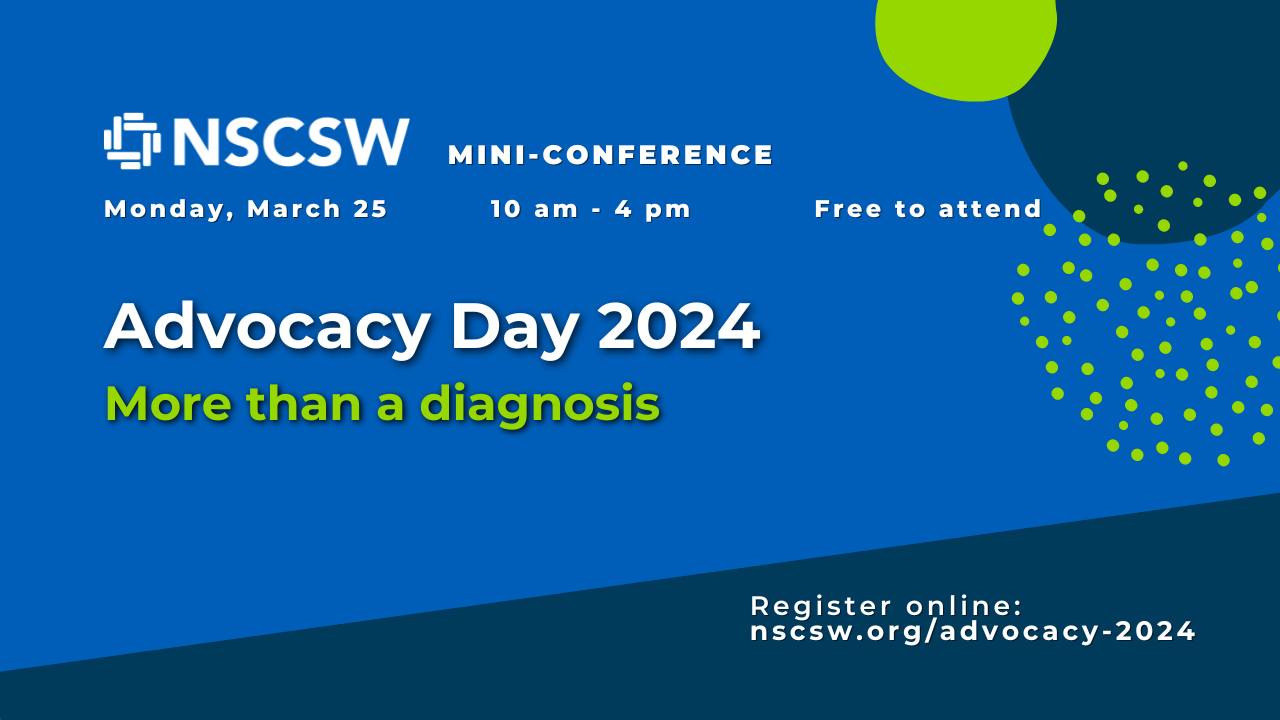
Please join us at our third annual Advocacy Day on Monday, March 25.
The social work profession recognizes that every individual is affected by multiple overlapping systems and influences; addressing them effectively requires advocacy for multi-systemic intervention. This knowledge is reflected in our code of ethics, which mandates a commitment to social justice, and in our professional development standards, which require every social worker in Nova Scotia to complete annual training or activities related to the pursuit of social justice.
The NSCSW’s advocacy for the safety and well-being of all people in Nova Scotia reflects the foundational values that we’re celebrating during National Social Work Month this year. Our advocacy is also informed by our research and reports. We developed a Social Policy Framework in 2020 in partnership with the Canadian Centre for Policy Alternatives’ NS office; the framework identifies guiding principles for social policy, and has since formed the foundation of the NSCSW’s social justice efforts. We are also guided by the recommendations of the mental health paper we published in 2021, Repositioning Social Work Practice in Mental Health in Nova Scotia, and the 2023 child welfare paper, Building an Ecosystem to Realize Children’s Rights and Support Family Well-Being in Nova Scotia.
We continue striving to fulfil the Truth and Reconciliation Commission’s calls to action, as well as recommendations that have emerged from essential public inquiry reports like Reclaiming Power and Place, Journey to Light, and Turning the Tide Together.
Advocacy Day origins
In 2022, the NSCSW launched its first Advocacy Day, in partnership with the Canadian Center for Policy Alternatives and the Canadian Mental Health Association Nova Scotia Division (CMHA-NS), in order to raise awareness of the principles of our Social Policy Framework and to advocate for increased funding for mental health, along with the other recommendations of its Repositioning Report.
In 2023, our second Advocacy Day again brought together a chorus of voices to advocate together for social policy that would make wellness more possible for all people living in this corner of unceded Mi’kma’ki. In partnership with CMHA-NS and Shelter Nova Scotia, we enabled social workers to come together with interprofessional colleagues, community advocates, and people with lived experience. We launched We Have Power, an advocacy toolkit developed in partnership with the Legal Information Society of Nova Scotia, which was designed to ensure Nova Scotians have robust tools to support them in advocating for the psychosocial, spiritual and structural determinants of their own well-being. Our activities also featured the launch of the NSCSW’s More than a Diagnosis postcard campaign, and amplified campaigns from the Nova Scotia Coalition for Community Well-Being (Poverty is a Political Choice and Housing is Health).
Gearing up
We planned several activities leading up to this year’s Advocacy Day to build momentum for change.
On March 11 we started gathering feedback from members on draft guidelines developed collaboratively by the NSCSW’s Social Justice Committee, Professional Standards and Ethics Committee and Clinical Committee, to support social workers in ways to integrate the We Have Power advocacy toolkit into their social work practice. The Repositioning report identified that nearly 100% of social workers providing mental health services experienced severe moral distress because the policies and practices where they work emphasize a biological-medical model of care that disregards social, structural and ecological determinants of care. By providing social workers with tools that they can share with service users who identify structural factors that are affecting their mental health, the NSCSW seeks to empower both social workers and the communities they serve to join together to advocate for the healing conditions that will make safety and well-being possible.
On March 15, the NSCSW, NSHEN, and other partners will join together with first voice speakers at an ethics café to explore social justice concerns and advocacy priorities regarding a projected expansion of medical assistance in dying (MAiD) criteria to include people suffering solely from chronic mental illness. Given the underlying structural factors that may influence a person’s decision to seek out MAiD, the NSCSW has partnered together with the Nova Scotia Health Ethics Network (NSHEN) to begin to outline trends of requests and concerns related to this issue. The trends identified can help shape the order of priorities regarding advocacy related to the structural determinants of mental health and well-being.
2024: A new Day
March 25, 2024, will be the NSCSW’s third Advocacy Day, again in partnership with CMHA-NS. This event will once again bring together a chorus of voices to continue to advocate for the psychosocial, spiritual and structural determinants of health.
The 2024 Advocacy Day campaign will focus upon the following issues:
- The need for increased funding for mental health and addiction services
- The need for a shift to interprofessional, collaborative and community-based primary care
- The need for trauma-informed and culturally safe care
- The need for funding of the psychosocial, structural and spiritual determinants of care
We look forward to seeing you and hope that you will take this month as an opportunity to reach out to your elected representatives to share your thoughts and concerns. Together, we can co-create a Nova Scotia that is safer for everyone.





